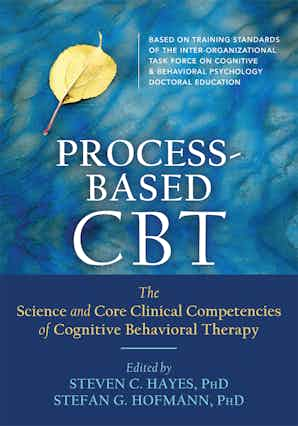CBT instructors, it’s time for a change

Sample the Instructor Resources*:
*Full versions of instructor resources, plus instructional videos, are available upon textbook adoption.
If you’re teaching CBT, you need this definitive resource to keep in step with the latest advances in behavioral science.
We are pleased to present this exciting new development in cognitive behavioral science. As we all know, cognitive behavioral therapy (CBT) is a powerful and evidence-based treatment for mental health conditions, and its applications continue to grow.
However, the proliferation of protocols targeting DSM-defined psychiatric disorders can make training difficult and limit the integration of research and clinical practice.
Featuring contributions from luminaries in behavioral science, Process-Based CBT embraces the behavioral, cognitive, and acceptance and mindfulness wings of this modality. It provides fundamental guidelines for integrating the philosophy and principles of these wings and traditions into a coherent approach to processes of change.
With this volume, students master the full range of core processes modified by CBT, and learn strategies for targeting these processes in practice for maximum efficacy.
Sincerely,
Process-Based CBT
Table of Contents
Introduction
Steven C. Hayes, PhD, Department of Psychology, University of Nevada; Stefan G. Hofmann, PhD, Department of Psychological and Brain Sciences, Boston University
Part 1
1. The History and Current Status of CBT as an Evidence-Based Therapy
Stefan G. Hofmann, PhD, Department of Psychological and Brain Sciences, Boston University; Steven C. Hayes, PhD, Department of Psychology, University of Nevada
2. The Philosophy of Science as It Applies to Clinical Psychology
Sean Hughes, PhD, Department of Experimental Clinical and Health Psychology, Ghent University
3. Science in Practice
Kelly Koerner, PhD, Evidence-Based Practice Institute
4. Information Technology and the Changing Role of Practice
Gerhard Andersson, PhD, Department of Behavioral Sciences and Learning, Linköping University, and Karolinska Institute
5. Ethical Competence in Behavioral and Cognitive Therapies
Kenneth S. Pope, PhD
Part 2
6. Core Behavioral Processes
Mark R. Dixon, PhD, Ruth Anne Rehfeldt, PhD, Rehabilitation Institute, Southern Illinois University
7. What is Cognition?: A Functional-Cognitive Perspective
Jan De Houwer, PhD, Dermot Barnes-Holmes, DPhil, Yvonne Barnes-Holmes, PhD, Department of Experimental Clinical and Health Psychology, Ghent University
8. Emotions and Emotion Regulation
Anthony Papa, PhD, Clinical Psychology PhD Program and Interdisciplinary Social Psychology PhD Program, University of Nevada; Emerson M. Epstein, MA, Clinical Psychology PhD Program, University of Nevada
9. Neuroscience Relevant to Core Processes in Psychotherapy
Greg J. Siegle, PhD, Western Psychiatric Institute and Clinic, University of Pittsburgh, Pittsburgh; James Coan, PhD, University of Virginia
10. Evolutionary Principles for Applied Psychology
Steven C. Hayes, PhD, Department of Psychology, University of Nevada; Jean-Louis Monestès, PhD, Department of Psychology, LIP/PC2S Lab, University Grenoble Alpes; David Sloan Wilson, PhD, Departments of Biology and Anthropology, Binghamton University
Part 3
11. Contingency Management
Stephen T. Higgins, PhD, Vermont Center on Behavior and Health; Departments of Psychiatry and Psychological Science, University of Vermont; Allison N. Kurti, PhD, Vermont Center on Behavior and Health; Department of Psychiatry, University of Vermont; Diana R. Keith, PhD, Vermont Center on Behavior and Health; Department of Psychiatry, University of Vermont
12. Stimulus Control
William J. McIlvane, PhD, University of Massachusetts Medical School
13. Shaping
Raymond G. Miltenberger, PhD, Bryon G. Miller, MS, Heather H. Zerger, MS, Marissa A. Novotny, MS, Department of Child and Family Studies, University of South Florida
14. Self-Management
Edward P. Sarafino, PhD, Department of Psychology, College of New Jersey
15. Arousal Reduction
Matthew McKay, PhD, The Wright Institute, Berkeley, CA
16. Coping and Emotion Regulation
Amelia Aldao, PhD, Andre J. Plate, BS, Department of Psychology, The Ohio State University
17. Problem Solving
Arthur M. Nezu, PhD, Christine Maguth Nezu, PhD, Alexandra P. Greenfield, MS, Department of Psychology, Drexel University
18. Exposure Strategies
Carolyn D. Davies, MA, Michelle G. Craske, PhD, Department of Psychology, University of California, Los Angeles
19. Behavioral Activation
Christopher R. Martell, PhD, ABPP
20. Interpersonal Skills
Kim T. Mueser, PhD, Center for Psychiatric Rehabilitation and Departments of Occupational Therapy, Psychology, and Psychiatry, Boston University
21. Cognitive Reappraisal
Amy Wenzel, PhD, ABPP
22. Modifying Core Beliefs
Arnoud Arntz, PhD, Department of Clinical Psychology, University of Amsterdam; Department of Clinical Psychological Science, Maastricht University
23. Cognitive Defusion
J. T. Blackledge, PhD, Department of Psychology, Morehead State University
24. Cultivating Psychological Acceptance
John P. Forsyth, PhD, Timothy R. Ritzert, MA, Anxiety Disorders Research Program, Department of Psychology, University at Albany, State University of New York
25. Values Choice and Clarification
Tobias Lundgren, PhD, Andreas Larsson, PhD, Department of Clinical Neuroscience, Center for Psychiatry Research, Karolinska Institute; Stockholm health care services
26. Mindfulness Practice
Ruth Baer, PhD, Department of Psychology, University of Kentucky
27. Enhancing Motivation
James MacKillop, PhD, Peter Boris Centre for Addictions Research, Department of Psychiatry and Behavioural Neurosciences, McMaster University; Homewood Research Institute, Homewood Health Centre; Lauren VanderBroek-Stice, MS, Department of Psychology, University of Georgia; Catharine Munn, MD, MSc, Peter Boris Centre for Addictions Research, Department of Psychiatry and Behavioural Neurosciences, McMaster University; Student Wellness Centre, McMaster University
28. Crisis Management and Treating Suicidality from a Behavioral Perspective
Katherine Anne Comtois, PhD, MPH, Department of Psychiatry and Behavioral Sciences, University of Washington; Sara J. Landes, PhD, Department of Psychiatry, University of Arkansas for Medical Sciences, and Central Arkansas Veterans Healthcare System
29. Future Directions in CBT and Evidence-Based Therapy
Steven C. Hayes, PhD, Department of Psychology, University of Nevada; Stefan G. Hofmann, PhD, Department of Psychological and Brain Sciences, Boston University
